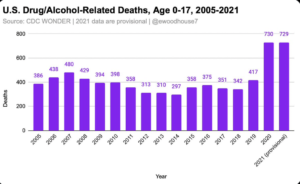Tweet [1]
Appendix II is a particularly interesting read. Some readers may recall the media storm against this paper, driven by some self-proclaimed fact-checkers. The appendix not only debunks all the “fact-checkers” claims but the authors also demonstrate how they were based not on any understanding of the paper (in fact it looks as if the “fact-checkers” mostly never even read it), but rather on superficial and to a large extent irrelevant “criticisms”, repeated blindly by one “fact-checker” and one media outlet after another.
Ananish Chaudhuri, writing in the Journal of Behavioral and Experimental Economics, reviews Paul Frijters’s, Gigi Foster’s, and Michael Baker’s The Great Covid Panic [3]. (HT Jeffrey Tucker) A slice:
Supporters of lockdowns typically argue that lockdowns saved lives and in the absence of the same there would be more lives lost. Unfortunately, this argument fails to hold water Bjørnskov (2021) [4]. has shown this to be incorrect for 24 European countries during the first half of 2020. There is controversy regarding true Covid death counts since in many cases deaths were counted as Covid deaths even if Covid was not the primary cause of death. (Boyle, 2021 [5]) To avoid this, Bjørnskov (2021) [4] looks at all-cause mortality since if lockdowns indeed resulted in lives being saved then countries with more stringent lockdowns should report fewer total deaths than those with weaker or no lockdowns. In Fig. 1 [6] , I reproduce the results from this study. It is clear that countries with more stringent lockdowns reported more total deaths.
And no, countries that implemented early lockdowns did not fare any better. It did not help them avoid further and stringent lockdowns down the road. Can reverse causality be an issue? Could it be the case that countries that experienced more cases and deaths ended up with more stringent lockdowns rather than lockdowns causing more deaths? One way to address this question is to exploit the Sebhatu et al. (2020) [7] finding regarding the large amount of mimicry among countries in implementing lockdowns. This allows Bjørnskov (2021) [4] to use the stringency index of other countries as an instrument. It turns out that mortality in these countries is strongly correlated with the stringency index of its neighbors implying that reverse causality is not a factor.
A key chapter in the book is Chapter 5: The Tragedy where the authors provide an accounting of the collateral damages caused by lockdowns ranging from the economic fall-out to the social and ethical consequences. This chapter should make most readers both sad and angry.
Rod Liddle regrets supporting lockdowns in Britain [9]. A slice:
It is difficult to credit the sheer surreal nature of that first lockdown — which, nonetheless, I rather enjoyed. In theory, we were allowed out shopping once every two weeks, and could take a constitutional once a day for one hour, provided we didn’t sit on a bench or talk to anyone else. I had reckoned it all to be a little Ballardian — not least in the stockpiling of lavatory paper and spaghetti. And yet, shockingly, it wasn’t Ballardian, because there was no real breakdown in society: we all did as we were told in an extraordinarily compliant manner. Meanwhile, somewhere in government, they were getting pissed at a party and vomiting, and two civil servants or wonks were trying to kick each other’s heads in.
I had been entirely in support of that first lockdown, in every measure of its severity, craven before the little Hitlers who sprang up to lecture you about keeping a safe distance outside the supermarket, masked-up and with chapped hands from the constant washing, and with the perpetual acrid, alcoholic reek of hand sanitiser in my nostrils. OK, I began having grave doubts later that summer, with the bizarre non-sequiturs about where we were allowed to go and what we were allowed to do — drinks down the pub, fine; visit your dying grandmother, banned etc. But for three months at least, I was a happy, supine, strangely unquestioning camper. My wife remarked to me, in March 2020: “It’s all shite, all of it. None of it will make a difference. It’s about control. And it will go on for ages.” Nonsense, my dear — it will all be over by September, and this is simply a case of ensuring the frailest of us survive, I assured her.
What a terrible thing it is to have to admit, in a national newspaper, that one’s wife was absolutely right, on all counts, and that I was wrong. The government was right too. The ministers, including the prime minister, and the civil servants took not the slightest notice of their own advice. They partied like it was 2019. They were happy to pass on the fatuous injunctions from Sage to the plebs and to ensure that transgressors were fined or shamed or both — but they knew it was all bollocks. Their actions prove this beyond all reasonable doubt.
Jay Bhattacharya tweets [11]:
The zeitgeist is shifting rapidly beyond the capacity of public health to induce fear. Next will come the widespread public realization that much of our covid policy response was useless in stopping covid & caused substantial harm.
Emma Woodhouse tweets this graph and commentary [12]: (HT Martin Kulldorff [13])
Tragic increase in U.S. pediatric drug/alcohol-related deaths during the pandemic.
No reason to believe these numbers will return to 2019 level anytime soon.
